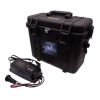Proactive Poseidon 12V Plastic Pumps
Features
- Designed for 2" schedule 40 and 80+ diameter wells.
- Easy to install and operate by connecting to 12V battery
- 400 hour motor life with user-replaceable module
- Free ground shipping
- Expedited repair and warranty service
- Lifetime technical support
- More
Overview
The Proactive Poseidon is engineered for pump tests and groundwater remediation. The Poseidon series pump line will fit into Schedule 40 or 80 2" diameter wells. The models available are: Poseidon 60 (pumps 60 feet depth to water) and Poseidon 80 (pumps 80 feet depth to water).
Easy Installation
The Poseidon pumps are easy to install and operate. Simply attach 3/8" ID polyethylene tubing to the barb tip using a hose clamp and attach suspension rope to the eye hook provided on top of the pump. Then, lower the pump to the desired water depth and energize the pump with a deep cycle marine battery and/or a small solar system.
Long Life Expectancy
The approximate life expectancy of the Poseidon motor module is 400 hours, depending on how often it is used. The patented replaceable motor module can be changed out within 60 seconds, eliminating downtime or expensive service calls. Just twist in the new motor module and start pumping again. Once the new motor module is installed, the pump is essentially new and will have a life span identical to a new pump. The Poseidon pump ships with one motor module installed on the pump. Additional motor modules can be purchased as needed.
- Power Consumption: 150 Watts (max)
- Volt Recommendation: 12-15V at source
- Maximum Amp Output: 10 Amps
- Measurements: 7.5" length x 1.82" diameter
- Required Tubing: 3/8" ID tubing
- (1) 12V Poseidon pump
- (1) Motor module
- (1) Set of 12V battery clamps
In The News
Spring 2025 Environmental Monitor Available Now
In the Spring 2025 edition of the Environmental Monitor, we highlight partnerships across the world and the importance of collaboration between government agencies, universities, environmental groups, local communities, and other stakeholders. From great white shark research in Cape Cod to monitoring fisheries in Lake Erie, this latest edition underscores partnerships that connect stakeholders in a watershed through environmental data. With an emphasis on data sharing, a combination of real-time and discrete sampling keeps the public and partners informed of environmental conditions. Our writers also sought out science professionals dedicated to working with peers within and outside of the environmental sector.
Read MoreMonitoring Mariculture in the Gulf of Alaska
The mariculture industry in the Gulf of Alaska has been steadily growing in recent years, guided by ongoing research to help refine farm location and cultivation practices. A subset of aquaculture, mariculture focuses on rearing organisms in the open ocean. In Alaska, finfish farming is illegal, so most farms cultivate kelp, oysters, or a combination of the two. These small, locally operated farms started popping up in the Gulf of Alaska in the early 1990s, when shellfish farming first became legal. Kelp farming did not begin to catch on in the state until 2016. Many of the coastal areas that have grown interested in mariculture are historically commercial fishing communities.
Read MoreSupplying Seattle’s Drinking Water: Using Data Buoys to Monitor the Cedar River Municipal Watershed
Providing clean, safe, and reliable drinking water for the 1.6 million people in the greater Seattle area is a top priority for Seattle Public Utilities (SPU). With limited water supplies, SPU dedicates considerable resources to maintain its watersheds and mountain reservoirs. About 70 percent of Seattle Water comes from the Cedar River Municipal Watershed , and the other 30 percent comes from the South Fork Tolt River Watershed . [caption id="attachment_39574" align="alignnone" width="940"] Data buoy in Chester Morse Lake . (Credit: Kevin Johnson / Seattle Public Utilities) [/caption] Jamie Thompson, a fisheries biologist at SPU, monitors aquatic ecosystems centered on fish listed under the U.S. Endangered Species Act (ESA).
Read More














